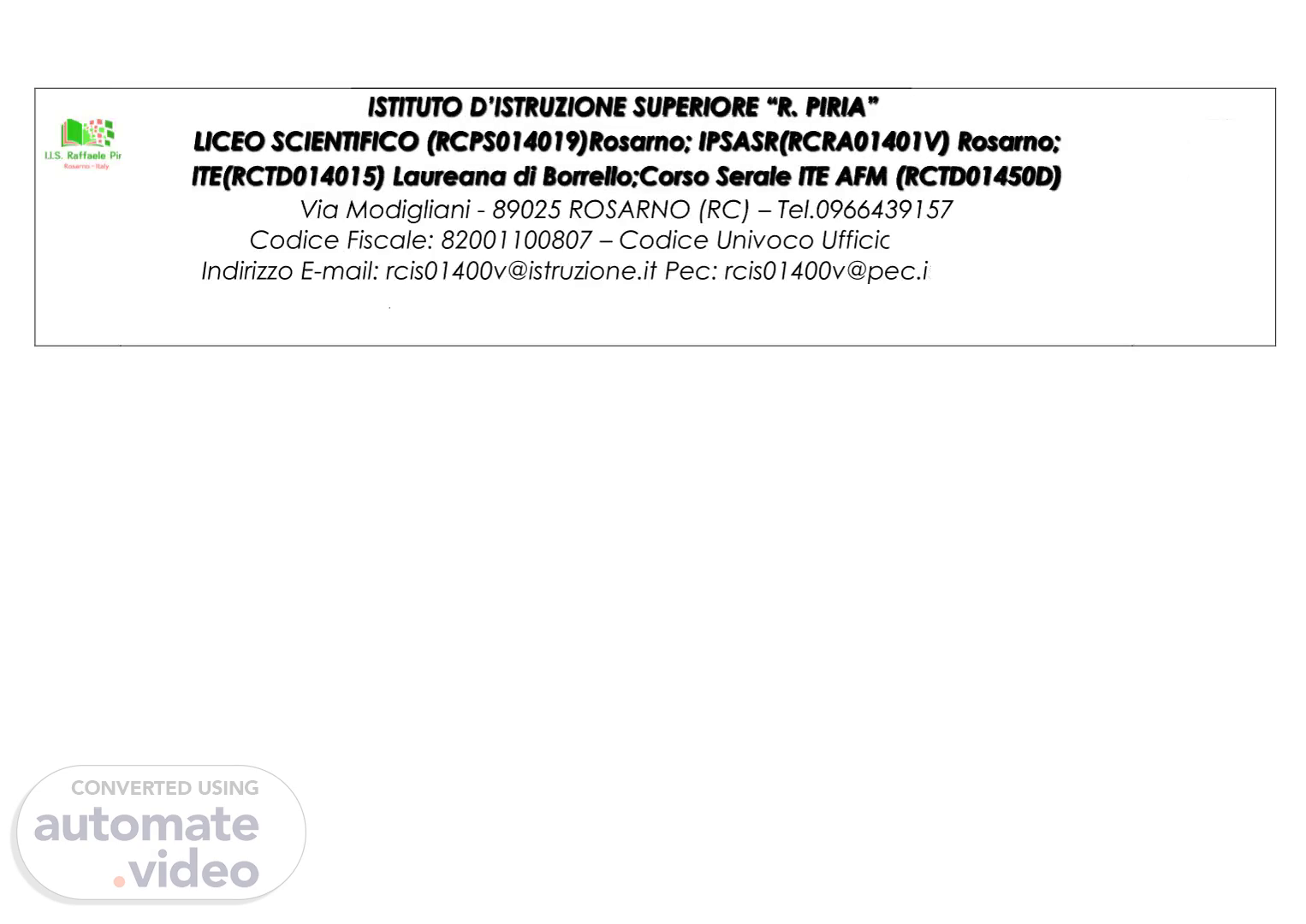
Page 1 (0s)
. . . ISTITUTO D’ISTRUZIONE SUPERIORE “R. PIRIA”.
Page 2 (25s)
. . SOCIOLOGICAL RESEARCH. “I AM”. INTRODUCTION. We are a group of students of the 4th grade of the IIS R. Piria of Rosarno (RC). When we were asked to do a sociological research on the theme "I AM", at first, we had several perplexities to argue on this issue. We think we know WHO we are, in reality, we are not sure, especially in light of the events of the last two years, which have shaken those few certainties we had, and almost destroyed some of our fixed points: we refer to pandemic, before, and to war now. In summary, we no longer know WHO we really are and WHAT we are looking for. We decided to ask this not only to ourselves, but also to our schoolmates from the 1d-4b / c and 5d classes of the Liceo Scientifico and the 2od, 3od, 4od and 5od classes of the dental technology sector, for a total of 146 interviewees. So, we formulated 24 questions and administered them through GOOGLE FORMS, receiving immediate answers that we shared in this link: https://docs.google.com/forms/d/1GPRfrXLEHyT_xJQcBJ26AxQpgJgPVv2sqlwZA1ZP_TE/edit #responses.
Page 3 (1m 14s)
. . RESULTS. As we can see from the sociological survey, the results show that the largest percentage of respondents are between the ages of 14 and 18. A small number of them claim to be over 18 years old..
Page 4 (1m 28s)
. . The families of the pupils involved are made up of 3 to 5 people for 72.6% of the interviewees. A very singular data emerged from the percentage of families made up of more than 5 people, or 15.1% against 12.3% for families with 2-3 people..
Page 5 (1m 47s)
. . Consequently, the interviewees (56.2%) have at least one sister or brother, or more (38.4%) and only a small number of them claim to be an only child..
Page 6 (2m 4s)
. . From the family unit, we move on to investigate the place where the interviewees live. More than half say they love the country they live in, plus 13.7% high approval rating. 34.2% do not like t 34.2% do not like the country they live in at all: Rosarno.
Page 7 (2m 26s)
. . When asked about feeling Italian or European, 51.4% replied that they feel Italian, against 44.5% who feel both Italian and EU citizens, less than 5% feel European..
Page 8 (2m 42s)
. . Called to respond on the private sphere of the perception of friendship, many young people (64.4%) declare that they have a large number of friends. Only a tiny fraction claim to have only one..
Page 9 (2m 59s)
. . Among the favourite hobbies: music (50.7%), followed by sport (33.6%) and reading (15.8%), bottom of the preferences..
Page 10 (3m 12s)
. . 62.3% of the interviewees declared themselves realistic, 25.3% optimistic and 12.3% pessimistic..
Page 11 (3m 24s)
. . For 47.3% of the interviewees humans are perceived as indifferent and passive, followed by selfish and greedy for 43.2% and altruistic and active for 9.6%..
Page 12 (3m 39s)
. . When asked "Who are you", the following emerges: 76.7% student, 15.1% child and 8.2% lack of identity..
Page 13 (3m 52s)
. . On the concept of freedom, 65.1% do not always feel free, compared to 28.1% who are not fully free, about 7% do not feel free at all..
Page 14 (4m 10s)
. . Similar data emerge from how the interviewees are seen from the outside: 71.2% students, 15.1% children and 13.7% lack of identity..
Page 15 (4m 24s)
. . Rain of criticism on politicians who are not interested in young people (72.6%), with 14% confident and 13% who believe in investing in education..
Page 16 (4m 42s)
. . As for the role of the family, for 61%, it supports all their choices..
Page 17 (4m 55s)
. . The future disturbs 52.7% of pupils, against 33% who are disturbed by the past and 13.7% by the present..
Page 18 (5m 6s)
. . More than 50% fear war, 37% fear the destruction of nature and 12% fear viruses..
Page 19 (5m 19s)
. . Half of the respondents feel sad only at times, 41% many times..
Page 20 (5m 31s)
. . 50% are sad because of people, 41.8% are sad for strictly personal reasons and a small part attribute it to their family..
Page 21 (5m 43s)
. . 57.5% say they are serene and cheerful, 33% almost never are, only about 9% define themselves as not very serene..
Page 22 (5m 57s)
. . Most of the respondents identify with a pet (dog) or a bird, 11% with a fish..
Page 23 (6m 9s)
. . Almost 50% are identified with a rose, about 33% with an oak and a minimal part with a wheat field..
Page 24 (6m 22s)
. . 50% identify with their parents, and then with a sports champion..
Page 25 (6m 36s)
. . 76.7% declare they want to continue their studies after graduation, about 20% would like to work, a small part declares they want to take a break..
Page 26 (6m 50s)
. . 76% say they are consistent with their choices, against 16% who consider themselves passive and 7% who declare themselves active..
Page 27 (7m 6s)
. . CONCLUSION. From the analysis that emerged in the graphs, we are generally optimistic, confident in the family and not in institutions, we believe in ourselves, we are happy to live in the city where we live, we feel faithful as pets, we are free as birds and we want to continue studies, we care about our planet and fear war and epidemics, we are firmly aware of being consistent with our life choices..